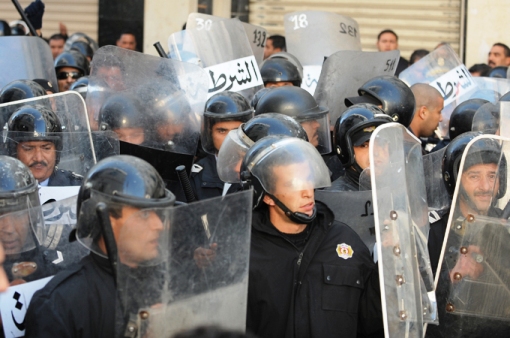 Brian Whitaker, who has closely followed the latest wave of Tunisian protests since they began in mid-December, writes on his blog about media coverage.
Brian Whitaker, who has closely followed the latest wave of Tunisian protests since they began in mid-December, writes on his blog about media coverage.
As if to prove Whitaker's point, mainstream media this morning are minimising the casualties from Saturday/Sunday as "at least 14" when activists and outlets like Al Jazeera have been reporting at least 20 deaths and as many as 51:
The Tunisian uprising is beginning to get more coverage in the English-language media, so this may be a suitable moment to look at the sort of coverage it is getting.
Considering the horrific violence meted out by the police over the weekend, the Ben Ali regime is being given an extraordinarily easy ride.
Tunisia Sunday LiveBlog: At Least 21 and Up to 50 Dead in Saturday ClashesThe Chicago Tribune, along with numerous other papers, carries a report from the Associated Press which refers to "rioting to protest joblessness and other social ills".
Apart from a reference to "mobs" attacking an office of the ruling party, there is no indication that this "unrest" (as AP puts it) might have a wider political context beyond "unemployment and social ills" – not even a single line about the repressive nature of the Ben Ali regime.
From the report, you would also imagine there is nothing but rioting – no mention of the very many peaceful protests (or the authorities' way of dealing with them).
Meanwhile, the New York Times uses a Reuters report which talks of a "wave of unrest":
Protesters say they are angry about a lack of jobs, but officials say the rioting is the work of a minority of violent extremists intent on damaging Tunisia.
Once again, there is no real context about the nature of the Tunisian regime. After quoting the call from Nejib Chabbi, the opposition politician, "to spare the lives of innocent citizens and to respect their right to protest peacefully", Reuters goes to some lengths to explain the regime's position:
Officials said the police had fired only in self-defense when violent crowds attacked, ignoring warning shots. The government said in a statement that the police were "doing nothing more than carrying out their legal and legitimate mission to maintain order and guarantee the safety and liberty of citizens".
It continues:
"President Ben Ali has said the violent protests are unacceptable and could discourage investors and tourists, who provide a large part of the country’s revenues. The authorities say they had responded to the protesters’ grievances by starting a program with employers to provide jobs for 50,000 unemployed graduates.
"Tunisia has recorded strong economic growth in the past decade, but it has not been fast enough to satisfy demand for jobs. Unemployment is particularly acute among the young in the interior of the country."
In one report, the BBC talks about "protests over rising food prices and unemployment in Tunisia" and adds: "The government says those responsible are extremists intent on destabilising the country."
However, another BBC report notes:
"Demonstrations are rare in Tunisia, where there are tight controls aimed at preventing dissent. The unrest has been linked to frustrations with the president and the ruling elite."
The Independent newspaper in Britain, also using an AP report, says:
"The protests against unemployment and lack of investment have lasted nearly a month. The authorities say the rioting is the work of a minority of extremists. President Ben Ali has said the protests are unacceptable."